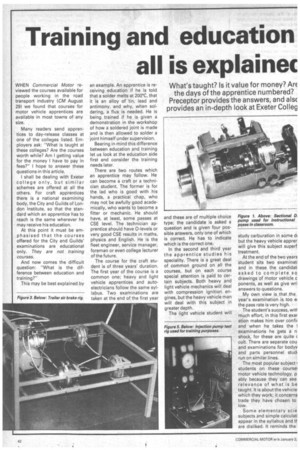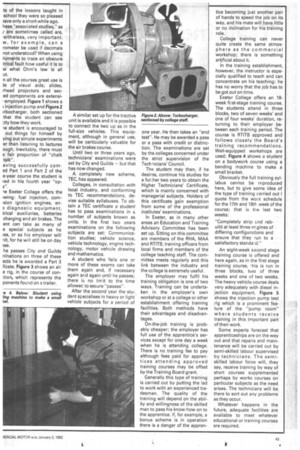Training and education all is explainec
Page 42

Page 43

If you've noticed an error in this article please click here to report it so we can fix it.
What's taught? Is it value for money? ArE the days of the apprentice numbered? Preceptor provides the answers, and alsc provides an in-depth look at Exeter Colleg
WHEN Commercial Motor rev i ewed the courses available for people working in the road transport industry (CM August 29) we found that courses for motor vehicle apprentices are available in most towns of any size.
Many readers send apprentices to day-release classes at one of the colleges listed. Employers ask: "What is taught at these colleges? Are the courses worth while? Am I getting value for the money I have to pay in fees?" I hope to answer these questions in this article.
I shall be dealing with Exeter college only, but similar schemes are offered at all the others. For craft apprentices there is a national examining body, the City and Guilds of London Institute, so that the standard which an apprentice has to reach is the same wherever he may receive his education.
At this point it must be emphasised that the courses offered for the City and Guilds' examinations are educational only. They are not training courses.
And now comes the difficult question: "What is the difference between education and training?"
This may be best explained by an example. An apprentice is receiving education if he is told that a solder melts at 200°C, that it is an alloy of tin, lead and antimony, and why, when soldering, a flux is needed. He is being trained if he is given a demonstration in the workshop of how a soldered joint is made and is then allowed to solder a joint himself under supervision.
Bearing in mind this difference between education and training let us look at the education side first and consider the training needs later.
There are two routes which an apprentice may follow. He can become a craft or a technician student. The former is for the lad who is good with his hands, a practical chap, who may not be awfully good academically, who wants to become a fitter or mechanic. He should have, at least, some passes at CSE level. The technician apprentice should have 0-levels or very good CSE results in maths, physics and English. He is the fleet engineer, service manager, foreman or even college lecturer of the future.
The course for the craft student is of three years' duration. The first year of the course is a common one; heavy and light vehicle apprentices and autoelectricians follow the same syllabus. Two examinations are taken at the end of the first year and these are of multiple choice type; the candidate is asked a question and is given four possible answers, only one of which is correct. He has to indicate which is the correct one.
In the second and third year the apprentice studies his speciality. There is a great deal of common ground on all the courses, but on each course special attention is paid to certain subjects. Both heavy and light vehicle mechanics will deal with compression ignition engines, but the heavy vehicle man will deal with this subject in greater depth.
The light vehicle student will study carburation in some di but the heavy vehicle apprer will give this subject superf treatment.
At the end of the two years student sits two examinati and in these the candidat. asked to complete so drawings of motor vehicle c ponents, as well as give wri answers to questions.
My own view is that the year's examination is too e. the pass rate is very high.
The student's success, witf much effort, in this first exar ation makes him over confic and when he takes the I examinations he gets a n shock, for these are quite ( cult. There are separate cou and examinations for bodyv and parts personnel stud. run on similar lines.
The most popular subjectl students on these course! motor vehicle technology, p ably because they can see relevance of what is be taught. It is about the vehicle: which they work; it concerns trade they have chosen to low.
Some elementary scie subjects and simple calculati appear in the syllabus and tt are disliked. It reminds the ts of the lessons taught in school they were so pleased .ave only a short while ago. hese "associated studies," as are sometimes called are, rertheless, very important. w, for example, can a rometer be used if decimals not understood? When using ruments to trace an obscure Arical fault how useful it is to w what Ohm's law is all ut.
n all the courses great use is ie of visual aids; slides, rhead projectors and seced components are extensiemployed. Figure 1 shows a 1 injection pump and Figure 2 irbocharger, both sectioned that the student can see :rtly how they work.
le student is encouraged to out things for himself by ying out simple experiments er than listening to lectures ough, inevitably, there must a fair proportion of "chalk talk".
eying successfully corned Part 1 and Part 2 of the e-year course the student is red in his fourth year "ops".
le Exeter College offers the wing: fuel injection, cornIsion ignition engines, ena diagnostic equipment, trical auxiliaries, batteries charging and air brakes. The ent can take as many of e special subjects as he les, or as his employer will nit, for he will still be on day ase.
he passes City and Guilds ninations on three of these ects he is awarded a Part 3 ficate. Figure 3 shows an air e rig, in the course of conAion, which represents the ponents found on a trailer. A similar set up for the tractive unit is available and it is possible to connect the two up as in the full-size vehicles. This equipment, although in general use, will be particularly valuable for the air brakes course.
Until two or three years ago, technicians' examinations were set by City and Guilds — but that has now changed.
A completely new scheme, TEC, has appeared.
Colleges, in consultation with local industry, and conforming to TEC recommendations, devise suitable syllabuses. To obtain a TEC certificate a student has to pass examinations in a number of subjects known as units. In the first two years examinations on the following subjects are set: Communication studies; vehicle science, vehicle technology, engine technology, motor vehicle drawing and mathematics.
A student who fails one or more of these exams can take them again and, if necessary again and again until he passes; there ki no limit to the time allowec to secure "passes".
After the second year the student specialises in heavy or light vehicle subjects for a period of one year. He then takes an "end test". He may be awarded a pass or a pass with credit or distinction. The examinations are set by the colleges concerned under the strict supervision of the Technicians' Council.
The student may then, if he desires, continue his studies for a furTher two years to obtain the Higher Technicians' Certificate, which is mainly concerned with managerial subjects. Holders of this certificate gain exemption from some of the professional institutes' examinations.
In Exeter, as in many other areas an Education and Training Advisory Committee has been set up. Sitting on this committee are members of the RHA, MAA and RTITB, training officers from local firms and members of the college teaching staff. The committee meets regularly and this link between the industry and the college is extremely useful.
The employer may fulfil his training obligation is one of two ways. Training can be undertaken in the employer's own workshop or at a college or other establishment offering training facilities. Both methods have their advantages and disadvantages.
On-the-job training is probably cheaper; the employer has full use of the apprentice's services except for one day a week when he is attending college. There is no training fee to pay although fees paid for apprentices attending approved training courses may be offset by the Training Board grant.
Generally this type of training is carried out by putting the lad to work with an experienced tradesman. The quality of the training will depend on the ability and willingness of the skilled man to pass his know-how on to the apprentice. If, for example, a bonus scheme is in operation there is a danger of the appren tice becoming just another pair of hands to speed the job on its way, and his mate will have little or no inclination for his training role.
College training can never quite create the same atmosphere as the commercial workshop; there is something artificial about it.
In the training establishment, however, the instructor is especially qualified to teach and can concentrate on his teaching; he has no worry that the job has to be got out on time.
Exeter College offers an 18week first-stage training course. The students attend in three blocks, two of seven weeks' and one of four weeks' duration, returning to their employer between each training period. The course is RTITB approved and follows closely the Board's training recommendations. Well-equipped workshops are used; Figure 4 shows a student on a bodywork course using a bending machine to make a small bracket.
Obviously the full training syllabus cannot be reproduced here, but to give some idea of the type of training carried out I quote from the work schedule for the 17th and 18th week of the course; that is the last two weeks:
"Completely strip and rebuild at least three engines of differing configurations and ensure that they run to a satisfactory standard."
An eight-week second stage training course is offered and here again, as in the first stage training course, his is run in three blocks, two of three weeks and one of two weeks. The heavy vehicle course deals very adequately with diesel injection equipment. Figure 5 shows the injection pump test rig which is a prominent feature of the "pump room" where students receive training in this important part of their work.
Some experts forecast that apprenticeships are on the way out and that repairs and maintenance will be carried out by semi-skilled labour supervised by technicians. The semiskilled labour force will, they say, receive training by way of short courses supplemented perhaps by works courses on particular subjects as the need arises. The technicians will be there to sort out any problems as they occur.
Whatever happens in the future, adequate facilities are available to meet whatever educational or training courses are required.














































